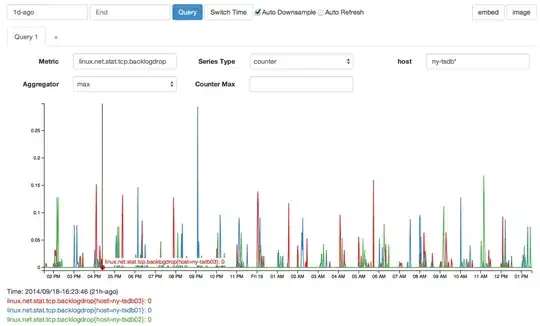tcp_v4_rcv [0] calls sk_add_backlog and if it fails it increments TCPBacklogDrop
2014 } else if (unlikely(sk_add_backlog(sk, skb,
2015 sk->sk_rcvbuf + sk->sk_sndbuf))) {
2016 bh_unlock_sock(sk);
2017 NET_INC_STATS_BH(net, LINUX_MIB_TCPBACKLOGDROP);
2018 goto discard_and_relse;
2019 }
sk_add_backlog fails only if sk_rcvqueues_full [1]:
801 /* The per-socket spinlock must be held here. */
802 static inline __must_check int sk_add_backlog(struct sock *sk, struct sk_buff *skb,
803 unsigned int limit)
804 {
805 if (sk_rcvqueues_full(sk, skb, limit))
806 return -ENOBUFS;
807
808 __sk_add_backlog(sk, skb);
809 sk->sk_backlog.len += skb->truesize;
810 return 0;
811 }
Underlying function __sk_add_backlog was recently [2] to allow at least one packet to pass:
+ * Do not take into account this skb truesize,
+ * to allow even a single big packet to come.
I suppose applying that patch to your kernel should fix the problem. Also you may try to increase default rcv buffer size in both OS and application (setsockopt SO_RCVBUF)
And your second question about RcvPruned - Linux increments that stat inside tcp_prune_queue[3]. That function is usually called when socket goes over it's rcv limits. So yet again you can either increase your rmem/SO_RCVBUF and/or tune your application to make read() calls more frequently (I assume your drops are closely correlated with Java's Stop-The-World GC pauses. So, tune your GC).
[0] http://lxr.free-electrons.com/source/net/ipv4/tcp_ipv4.c?v=3.15#L2014
[1] http://lxr.free-electrons.com/source/include/net/sock.h?v=3.15#L802
[2] https://git.kernel.org/cgit/linux/kernel/git/torvalds/linux.git/commit/?id=0fd7bac6b6157eed6cf0cb86a1e88ba29e57c033
[3] http://lxr.free-electrons.com/source/net/ipv4/tcp_input.c?v=3.15#L4662
